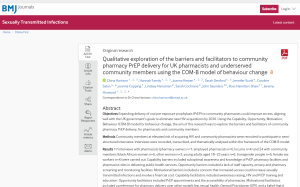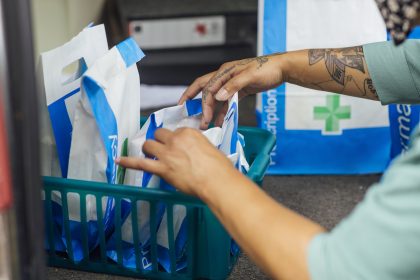Community pharmacies could expand PrEP access to help prevent HIV
18 November 2024
A new study has found that community pharmacies could play a significant role in expanding access to pre-exposure prophylaxis (PrEP), a highly effective pill for preventing HIV infection. The researchers found that pharmacies could provide a more convenient and discreet option for those who are underserved by the current model of PrEP delivery through sexual health clinics in England.
The stigma surrounding sexual health services and their potentially inconvenient locations prevent some people from accessing PrEP. These barriers may disproportionately affect women, people from global majority communities and transgender people who may be at risk of acquiring HIV but are less likely to access PrEP through sexual health clinics.
The study was carried out by researchers from the National Institute for Health and Care Research Applied Research Collaboration West (NIHR ARC West) and the NIHR Health Protection Research Unit in Behavioural Science and Evaluation (HPRU) at the University of Bristol. It involved interviewing community pharmacists and members of key at-risk groups to identify the barriers and facilitators of community pharmacy PrEP delivery using the Capability, Opportunity, Motivation, Behaviour (COM-B) model.
The study identified several barriers to pharmacy-based PrEP delivery. These included:
- A lack of awareness and knowledge about PrEP
- A lack of PrEP training for pharmacists
- A lack of privacy and facilities within pharmacies
The study also identified facilitators of pharmacy-based PrEP delivery. These included:
Raising awareness of PrEP
- Providing PrEP specific training for pharmacists
- Pharmacy accessibility, including proximity within the community, extended opening hours and walk in service
- The discretion pharmacy PrEP delivery could offer
To make pharmacy PrEP delivery viable, the study suggests developing a behaviour change intervention focusing on raising awareness and educating both pharmacists and community members.
Systemic changes, such as funding and infrastructure improvements will also be necessary to support PrEP delivery via pharmacies as will policy changes allowing pharmacies to access NHS PrEP stock. The researchers are now working on a pilot to test the feasibility of PrEP being accessed via pharmacies .
Dr China Harrison, lead researcher from University of Bristol, NIHR ARC West and NIHR HPRU, said:
“The UK has seen a decline in new HIV diagnosis among gay, bisexual and other men who have sex with men, largely due to PrEP use. However, new HIV diagnoses among heterosexual individuals, particularly those from marginalised communities are increasing.
“Our study highlights the acceptability of pharmacy PrEP delivery for pharmacists and underserved community members offering an important opportunity to expand PrEP delivery and address these health disparities.
“We are now working on a pilot to test the feasibility of PrEP delivery via pharmacies. If successful, pharmacies could help bridge the gap in HIV prevention for underserved communities, bringing the UK closer to its goal of eliminating new HIV infections by 2030”
Professor Jeremy Horwood, principal investigator of the study and researcher from University of Bristol, NIHR ARC West and Centre for Academic Primary Care said:
“Pharmacies offer an untapped potential to reach people who might not feel comfortable accessing PrEP via traditional sexual health services.
“With the right training and support, pharmacies can help close the gap in HIV prevention and ensure that PrEP is accessible to everyone who needs it and work towards reducing new HIV acquisitions across all communities.
“Although pharmacy PrEP delivery is acceptable to pharmacists and community members, there are system and policy barriers that would need to be overcome to make this feasible.”
Paper


